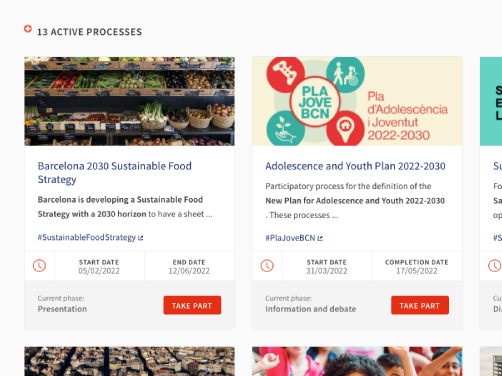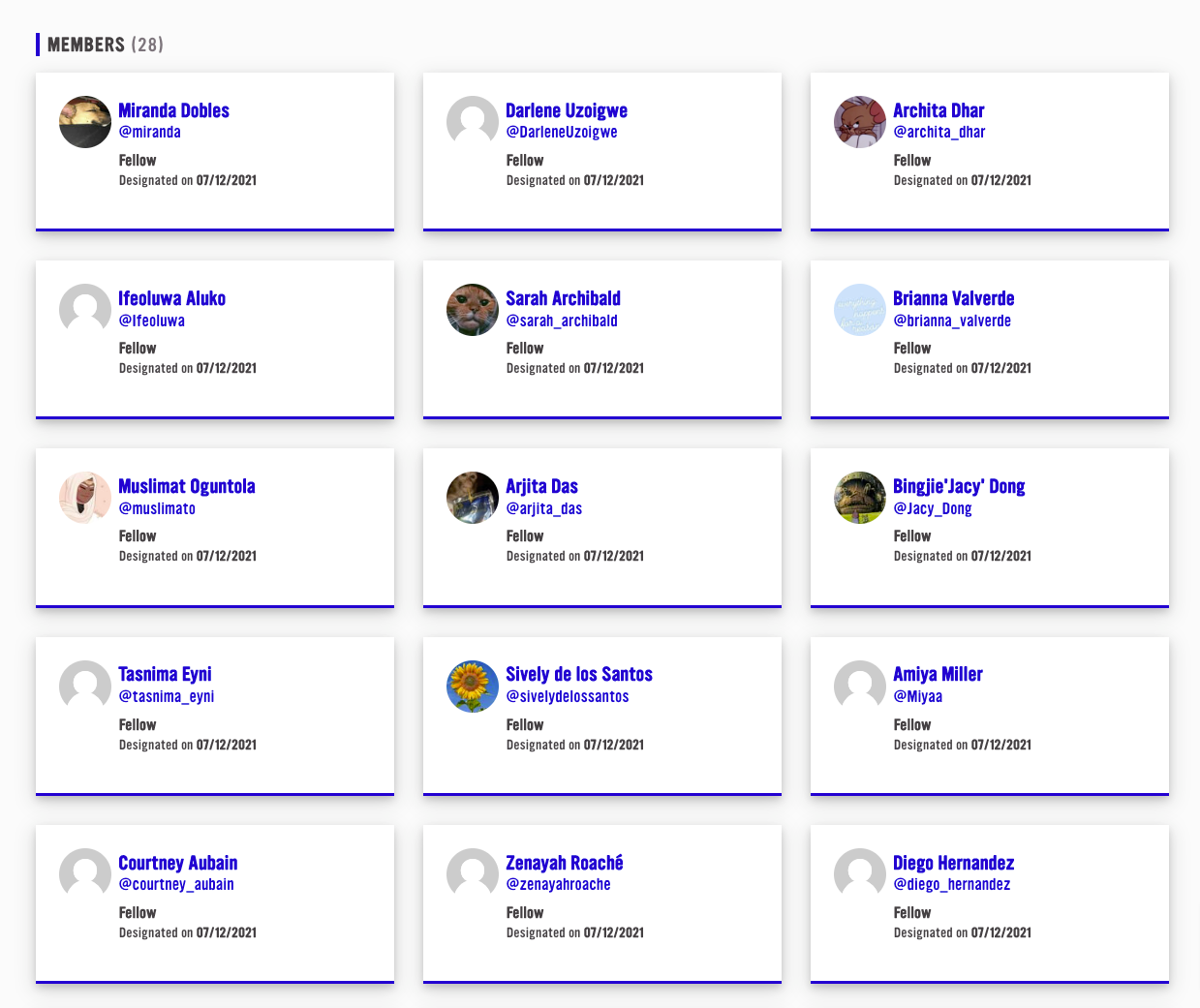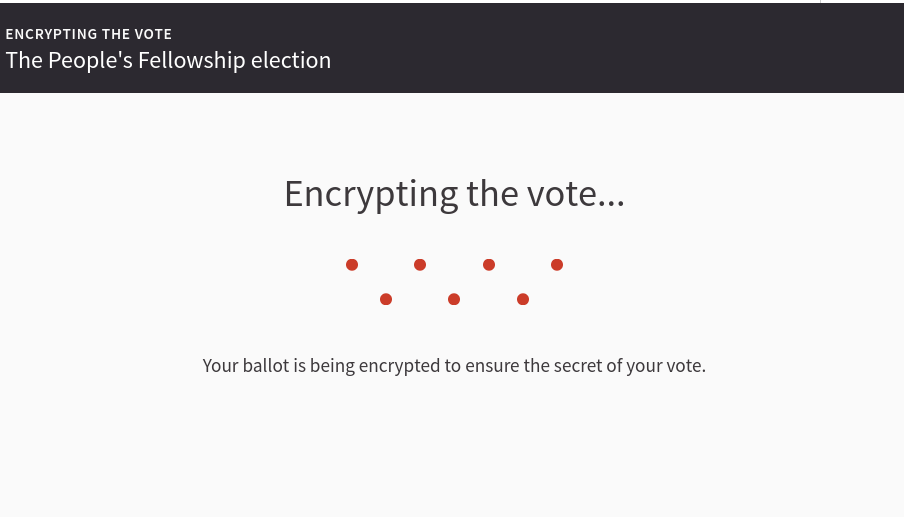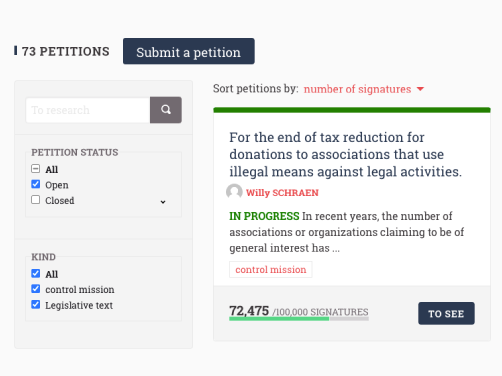Funcionalitats
For democratic organizations and collectives of any size and kind.
You can use Decidim in a public or private organisation, with hundreds or thousands of potential participants, such as a city council, an association, a university, an NGO, a trade union, a neighbourhood association or a cooperative...
Thanks to Decidim you will be able to configure spaces for participation (initiatives, assemblies, processes or consultations) and enrich them through the multiple available components (face-to-face meetings, surveys, proposals, voting, follow-up of results, comments and many more).
Espais de participació
- Processos participatius
-
Òrgans
de participació - Votings
- Iniciatives
To democratize common issues, step by step
Processos permet crear, activar/desactivar i administrar diferents processos de participació, articular-los en diferents fases en què poden combinar-se tots els components. Exemples de processos participatius son: un procés d’elecció dels membres d’un consell, pressupostació participativa, un procés de planificació estratègica, la redacció col·laborativa d’un reglament o norma, el disseny d’un espai urbà o la producció d’un pla de polítiques públiques.

The power of collective self-organization
Makes it possible to set up decision-making bodies or groups (councils, working groups, commissions, etc.) that meet regularly, detailing their composition, listing and geolocating their meetings. It allows participation in them, for example, attending in person or online, adding issues to the agenda, or commenting on the proposals and decisions taken by that body.

The right to decide with all democratic guarantees
Makes it possible to coordinate referendums, trigger discussions and debates, get voting results published and connect to a secure e-voting system.

Setting everyone's agenda, within everyone's reach
Participants can create collaborative initiatives, define their path and goals, gather endorsements, discuss, debate and disseminate initiatives, set meeting points where signatures can be collected from attendees or debates open to other members of the organisation.

Processos participatius
Processos participatius To democratize common issues, step by step
Processos permet crear, activar/desactivar i administrar diferents processos de participació, articular-los en diferents fases en què poden combinar-se tots els components. Exemples de processos participatius son: un procés d’elecció dels membres d’un consell, pressupostació participativa, un procés de planificació estratègica, la redacció col·laborativa d’un reglament o norma, el disseny d’un espai urbà o la producció d’un pla de polítiques públiques.

Òrgans
de participació
Òrgans
de participació The power of collective self-organization
Makes it possible to set up decision-making bodies or groups (councils, working groups, commissions, etc.) that meet regularly, detailing their composition, listing and geolocating their meetings. It allows participation in them, for example, attending in person or online, adding issues to the agenda, or commenting on the proposals and decisions taken by that body.

Votings
Votings The right to decide with all democratic guarantees
Makes it possible to coordinate referendums, trigger discussions and debates, get voting results published and connect to a secure e-voting system.

Iniciatives
Iniciatives Setting everyone's agenda, within everyone's reach
Participants can create collaborative initiatives, define their path and goals, gather endorsements, discuss, debate and disseminate initiatives, set meeting points where signatures can be collected from attendees or debates open to other members of the organisation.

Components
Propostes
Your ideas in detail
Create a proposal using a creation wizard, compare it with the existing ones, publish it on the platform and include additional information such as geolocation or attached documents and images. This component also allows you to navigate, filter and interact with a set of proposals. In addition, with the proposal-incubator you can create collaborative proposals.
Votacions
Decide your choice
Offers organisations the possibility of activating different voting or support systems around proposals: unlimited, limited to a given threshold, weighted, cost-based, etc. Backed by secure and encrypted e-voting technology.
Resultats
No proposal without an answer
Turn proposals into results and give official responses concerning their acceptance or rejection, merging various proposals into a single result.
Rendició de comptes
End-to-end transparency
It offers the possibility to subdivide results into projects, to define and apply progress states around their implementation, as well as to show the degree of achievement of results grouped by categories and scopes.
Trobades
To meet and not miss anything
El component trobades ofereix a les organitzacions i als participants la possibilitat de convocar reunions, definir lloc i hora, registrar i limitar el nombre d’assistents, definir l’estructura i els continguts d’una cita o trobada presencial, així com de publicar-ne les actes i les propostes resultants.
Textos participatius
To analyze, synthesize, and build in common
Can be used to convert long text documents into several proposals or results and, vice versa, to compose and display a unified text based on a collection of proposals or results.
Conferència
On els grans esdeveniments s’estrenen
Create a website for a big event. Unify the program by joining up a series predefined meetings (chats, workshops, etc.), and manage attendees.
Enquestes
Perquè l'opinió de la teva comunitat importa
Design and publish surveys. Display and download results.
Sorteig
La igualtat i la justícia de l'atzar
Allows to select a number of proposals (e.g. candidates for a jury) with random, yet reproducible, procedures that guarantees non-biased and uniform distributions.
Comentaris
Construyendo la inteligencia colectiva
Enables users to add comments, to value them in favour, against or neutral, vote them, answer and receive notifications about responses.
Pàgines i blogs
La teva comunitat, informada i al dia
Create informative pages with rich text formatting, embedded pictures and videos. The blog component makes possible the creation of posts or news, and to navigate them chronologically.
Notificacions
Personalised information on interesting content
Decidim enables you to track any space or component so that you can receive updates whenever they happen.
Butlletí
Sencill però potent
Send emails to everyone registered in the platform or to those who participate in a specific space.
Mòduls
Grow beyond the default components. The Decidim community has developed hundreds of modules to expand the platform beyond the basics and cater to your needs even better.
Explore the modulesFAQs
What is Decidim's trademark policy?
Decidim and the Decidim logo are registered by the Association, they cannot be used as a commercial product nor cannot be sold. If used, the credit has to be referenced to the project. You can read more about this in our Trademark policy.
Can I join the Metadecidim community even if I don't live in Barcelona?
Of course you can. People do so through participatory processes, debates, translations, etc. that you might find in Metadecidim. Decidim was born in Barcelona and that is why there is a strong territorial bond with this city, but above all, it's a project for the commons.
Is there any tutorial to start setting it up?
You can check the latest version of our admin manual in the Documentation section.
How can I get more information about the Decidim Association?
In the general assembly of the Decidim Association you can find more info abous us, follow the activity of the meetings and check relevant information (statutes, legal agreements, the internal regulations)

